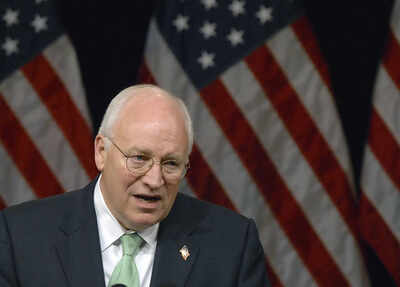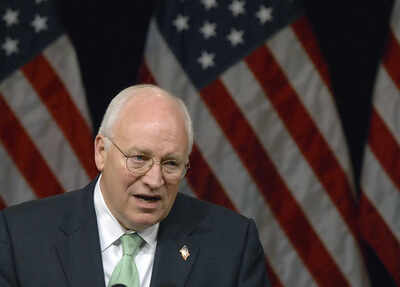
The former President of the United States, George W Bush, has paid tribute to Dick Cheney, stating that his passing is “a loss to the nation and a sorrow to those who knew him.”
Cheney passed away from health complications related to pneumonia as well as cardiac and vascular diseases on Monday night at the age of 84, as informed by a statement from his family.
He emerged as one of the most influential vice-presidents in U.S. history while serving under Bush, leaving behind a divisive legacy as a key planner of the “war on terror,” along with being an early supporter of the 2003 Iraq invasion.
Bush remarked in a statement, “History will remember him among the greatest public servants of his era.”
Bush further stated that Cheney was “a patriot who brought honesty, deep intelligence, and seriousness of purpose to all his roles in government.”
“I relied on his straightforward, honest guidance, and he consistently delivered his utmost. He adhered firmly to his beliefs and prioritized the freedom and safety of the American people.”
Condoleezza Rice, who held the position of Secretary of State during Cheney’s tenure, expressed her respect for his “integrity and his devotion to our nation.”
“He served as an encouraging presence and teacher, imparting valuable lessons about public service,” she commented on X.
Bill Clinton, a former Democratic President, remarked: “While we frequently disagreed, I always held deep respect for his commitment to our country and his steadfast sense of duty.”
Although Cheney was a prominent figure within the Republican party for many years, he became a vocal critic under Donald Trump’s leadership.
The current president has not yet addressed Cheney’s death, but the White House has indicated that Trump is “aware” of it.
Mike Johnson, the Republican House Speaker, stated: “Scripture is explicit, we honor those deserving of honor.”
“Even amidst political disagreements later in life, one must recognize the sacrifices and service rendered to the nation,” he added.
Flags outside the White House were lowered to half-staff on Tuesday morning, shortly following the announcement of his passing.
In their statement regarding his death, Cheney’s family expressed that he was a “great and good man who instilled in his children and grandchildren a love for our nation, along with principles of courage, honor, love, kindness, and the joy of fly fishing.”
Cheney was a contentious political figure, especially noted for his involvement in the “war on terror,” which led to the U.S. invasion of Iraq following the 9/11 attacks.
Iraqi author Sinan Antoon reflected that Cheney’s enduring legacy in Iraq is marked by “chaos and terrorism.”
“In an alternate reality, Dick Cheney would undoubtedly be labeled a war criminal and face trial,” he stated during the BBC’s Newshour broadcast.
Kristofer Goldsmith, a U.S. Army veteran who served in Iraq, also commented to the BBC that “many recognize Dick Cheney as a figure who caused a significant crisis resulting in the deaths of countless individuals.”
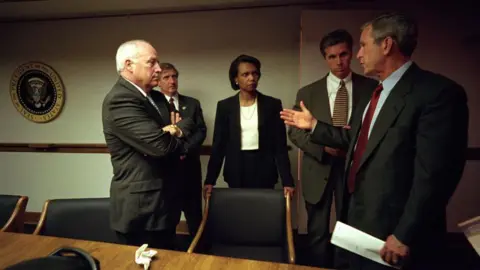 George W. Bush Presidential Library/Getty Images
George W. Bush Presidential Library/Getty ImagesRichard “Dick” Cheney was born in Lincoln, Nebraska in 1941 and later received a scholarship to attend the esteemed Yale University, though he did not complete his degree.
He subsequently earned a Master’s degree in political science from the University of Wyoming.
Cheney’s initial experience in Washington began in 1968 when he worked for William Steiger, a young Republican congressman from Wisconsin.
He became Gerald Ford’s chief of staff in 1975 at only 34 years old, later serving a decade in the House of Representatives.
As Secretary of Defense under George Bush Sr., he oversaw the Pentagon during the Gulf War of 1990-91, which witnessed a U.S.-led coalition driving Iraqi forces out of Kuwait.
In 2001, he was appointed as VP to George W Bush, assuming a more authoritative role in major policy decisions than most of his predecessors.
This role will define his legacy, both most notably and controversially.
 Getty Images
Getty ImagesDuring George W. Bush’s presidency, Cheney transformed the traditionally vacant role of vice-president with limited formal authority into a de-facto deputy presidency, directing U.S. foreign relations and national defense after the September 11 attacks on the Twin Towers and Pentagon in 2001.
He was a prominent proponent of military interventions in both Afghanistan and Iraq.
Before the Iraq invasion, Cheney claimed that Saddam Hussein’s government had so-called weapons of mass destruction, which were never uncovered during the military action.
He also asserted multiple times that there were connections between Iraq and al-Qaeda, the terrorist organization led by Osama bin Laden that took responsibility for the 9/11 attacks. He warned that the attackers would face the “full fury” of American military power.
Cheney’s significant involvement in the war profoundly influenced his political legacy as the U.S. took years to disengage from its expensive conflict in Iraq, leading to the deaths of countless individuals.
His political journey later inspired a major film, “Vice,” in 2018, featuring Christian Bale, who won a Golden Globe for his portrayal of Cheney.
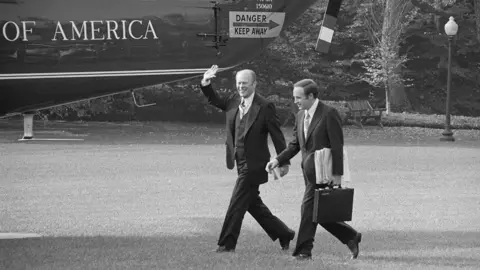 Getty Images
Getty ImagesThroughout his lifetime, Cheney faced numerous heart health challenges.
His first heart attack occurred in 1978 when he was only 37 years old, during a campaign for a House of Representatives position while smoking three packs of cigarettes daily.
In 2010, he underwent surgery to have a heart pump implanted in an attempt to address “progressive congestive heart failure.”
By that time, he had experienced five heart attacks. Two years later, Cheney received a complete heart transplant.
He is survived by his spouse, Lynne, his daughters Liz and Mary Cheney, and seven grandchildren.
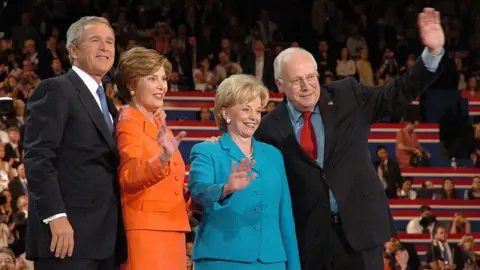 Lawrence Lucier/FilmMagi
Lawrence Lucier/FilmMagiDespite spending decades serving Republican presidents, Cheney became a staunch adversary of President Donald Trump.
Initially endorsing him in 2016, Cheney grew alarmed by the allegations of Russian interference in the presidential election and Trump’s seemingly indifferent approach towards NATO.
He supported his daughter Liz as she emerged as a leading voice against Trump within the House of Representatives, denouncing the denial of the 2020 election results.
Two months prior to the last presidential election, Cheney made a significant move: announcing he would cast his vote for the Democrats’ Kamala Harris.
He declared that “there has never been anyone who posed a greater threat to our democracy than Donald Trump.”
In response, Trump disparaged Cheney as an “irrelevant RINO” – an abbreviation for “Republican in Name Only.”
Upon hearing of Cheney’s death, Harris expressed, “his passing signifies the loss of an individual who, with great commitment, dedicated so much of his life to the country he cherished.”
In his later years, Cheney became unwelcome among his own party, which had transformed under Trump’s leadership.
In an ironic turn of events, his critiques of Trump and support for Harris gained him some admiration from those on the political left who had previously condemned him for years.

